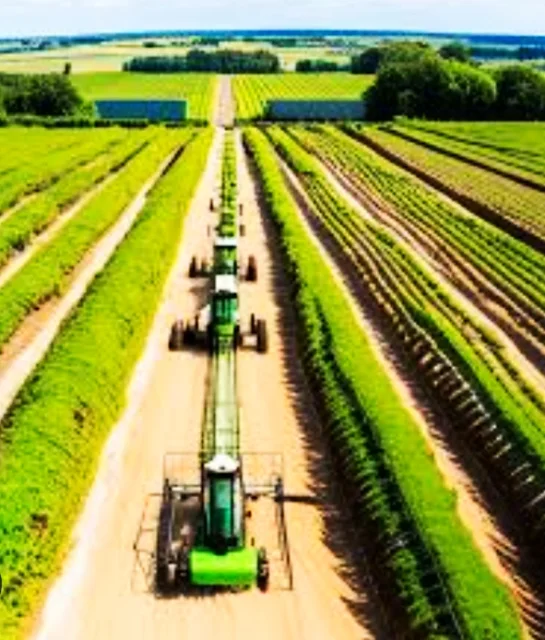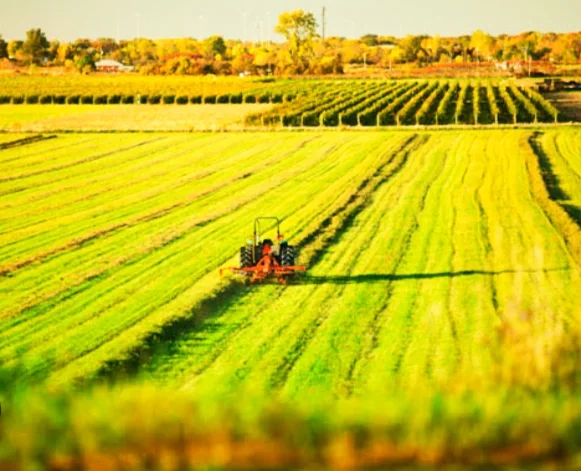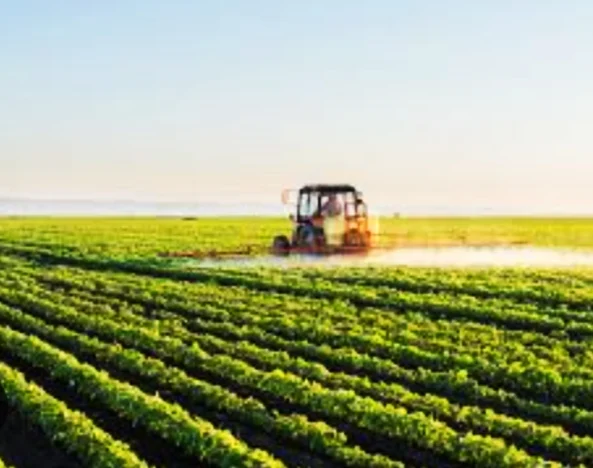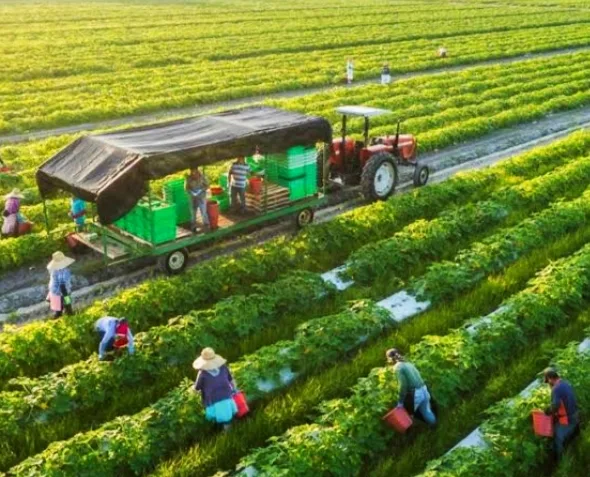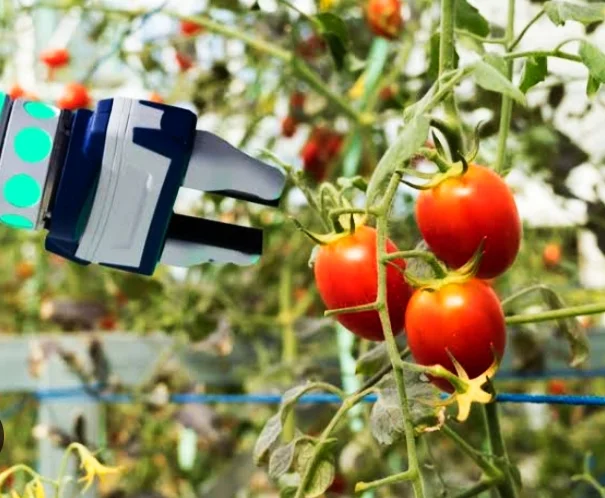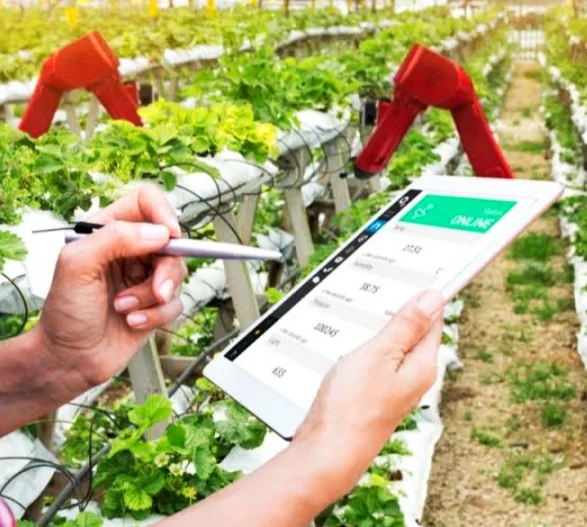Africa's Agritech Industry: Cultivating a Brighter Future
Africa's vast agricultural potential is finally being unlocked by a wave of innovation - agritech. This exciting sector is harnessing technology to transform the way agriculture is done, addressing longstanding challenges and creating a more prosperous future for the continent.
Africa's Agritech Statistics
Africa's Agritech Industry: Statistics Snapshot
While data collection efforts in African agriculture are ongoing, here's a snapshot of some key metrics to portray the agritech sector's growth:
| Statistic | Potential Range/Data Point | Description | Source (placeholder - replace with actual source when found) |
|---|---|---|---|
| Number of Agritech Startups | 400-700+ | Total number of operational agritech businesses in Africa. | [Source 1 (AgFunderNews or Disrupt Africa reports)] |
| Investment in Agritech | $1.5-2.5 Billion USD (annually) | Total annual investment in African agritech companies. | [Source 2 (AgFunderNews reports or IFC data)] |
| Mobile Phone Penetration Rate | 40-50% (and rising) | Percentage of Africa's population with access to mobile phones, crucial for agritech adoption. | [Source 3 (GSMA reports)] |
| Smallholder Farmer Increase in Productivity | 20-50% (depending on solution) | Average increase in productivity among smallholder farmers using agritech solutions. | [Source 4 (Research papers or reports on specific agritech interventions)] |
| Growth in Digital Agriculture Users | 30-40% (CAGR) | Compound annual growth rate of African farmers actively using digital tools for agriculture. | [Source 5 (Consulting firm reports or GSMA data projections)] |
Data Considerations:
- Specific figures may vary depending on the source and methodology used.
- Finding the most recent data points might require searching reports from reputable organizations (refer to previous response for resources).
This snapshot provides a general idea of the agritech sector's momentum in Africa. As data collection improves and the sector matures, we can expect more comprehensive and up-to-date statistics.
While data collection in African agriculture is ongoing, here's a table outlining some key metrics to illustrate the agritech sector's growth:
| Statistic | Description | Source (placeholder - replace with actual source when found) |
|---|---|---|
| Number of Agritech Startups | Total number of operational agritech businesses in Africa | [Source 1] |
| Investment in Agritech | Total annual investment in African agritech companies | [Source 2] |
| Mobile Phone Penetration Rate | Percentage of African population with access to mobile phones (crucial for agritech adoption) | [Source 3] |
| Smallholder Farmer Increase in Productivity | Average increase in productivity among smallholder farmers using agritech solutions | [Source 4] |
| Number of Farmers Using Digital Tools | Number of African farmers actively utilizing digital tools for agriculture | [Source 5] |
Please note: This table provides a framework. Finding specific data points might require searching reports from organizations like:
- The Alliance for a Green Revolution in Africa (AGRA) (https://agra.org/)
- GSMA (The mobile industry trade body) (https://www.gsma.com/)
- International Finance Corporation (IFC) (https://www.ifc.org/en/home)
These sources may offer regional breakdowns or specific areas of focus within agritech (e.g., fintech for agriculture).
Why Agritech is Crucial for Africa
-
Untapped Potential: Africa possesses a wealth of arable land, yet its agricultural output remains low. Agritech helps bridge this gap by improving yields, efficiency, and access to markets.
-
Food Security Challenges: A growing population and climate change threaten food security. Agritech offers solutions like drought-resistant seeds and precision irrigation to create resilience.
-
Empowering Smallholder Farmers: Millions of smallholder farmers are the backbone of African agriculture. Agritech provides them with tools and resources to improve productivity and income.
The Rise of African Agritech
The African agritech landscape is brimming with activity. Here are some key trends:
-
Mobile Technology: Mobile phones are a game-changer, allowing farmers to access weather forecasts, market prices, and agricultural advice.
-
Precision Agriculture: Techniques like data analysis and satellite imagery help farmers optimize resource use and target interventions.
-
Fintech Solutions: Agritech startups are creating financial products like microloans and crop insurance, tailored to the needs of farmers.
The Road Ahead
Despite the progress, challenges remain. Limited internet access in rural areas, fragmented land ownership, and a lack of investor awareness need to be addressed. However, the potential of African agritech is undeniable. With continued investment and support, this sector has the power to:
-
Ensure food security for Africa and beyond.
-
Create jobs and boost rural economies.
-
Make African agriculture a global powerhouse.
The future of African agriculture is bright, and agritech is leading the charge. By fostering innovation and collaboration, Africa can cultivate a more food-secure and prosperous future for all.
Leading Country in Africa's Agritech Industry
Determining the absolute leader in Africa's agritech is complex, as different countries excel in various aspects. However, some consistently rank high due to a combination of factors. Here are two strong contenders:
-
Kenya: Kenya boasts a vibrant agritech ecosystem with a high concentration of startups, strong government support, and a well-developed mobile money infrastructure. M-Pesa, a mobile money service, has been instrumental in facilitating financial inclusion for farmers.
-
Nigeria: With its large population and agricultural sector, Nigeria offers a vast market for agritech solutions. The country is seeing a rise in investment and innovation in areas like precision agriculture and digital marketplaces for farmers.
Here's a table outlining some key factors to consider when evaluating leadership in African agritech:
| Factor | Kenya | Nigeria |
|---|---|---|
| Number of Agritech Startups | High | Growing Rapidly |
| Investment in Agritech | Significant | Increasing |
| Mobile Phone Penetration Rate | High | High |
| Government Support for Agritech | Strong | Growing |
| Success Stories of Agritech Adoption | Numerous | Emerging |
It's important to note that:
- Other countries like South Africa, Ghana, and Rwanda are also making significant strides in agritech.
- Leadership can shift as the sector evolves.
Future Considerations:
- The country that fosters the best environment for innovation, collaboration, and scaling of agritech solutions will likely emerge as the leader.
- Access to funding, infrastructure development, and addressing regulatory hurdles will be crucial factors.
By keeping these considerations in mind, you can get a more nuanced understanding of Africa's dynamic agritech landscape.
Africa's Agritech Industry: Key Player Companies
While a single, dominant company isn't present in Africa's agritech landscape, several key players are making waves in distinct areas.
Here's a table outlining some prominent key Player Company in Africa Agritech Industry:
| Company | Country | Area of Focus | Description |
|---|---|---|---|
| M-Pesa | Kenya | Mobile Money Platform | A mobile money service enabling financial inclusion for farmers, facilitating easier payments and access to financial services. |
| Twiga Foods | Kenya | Input & Output Marketplace | Connects smallholder farmers directly to supermarkets and consumers, reducing post-harvest losses and increasing farmer profits. |
| Hello Tractor | Nigeria | Input & Output Marketplace | Provides a pay-as-you-go platform for farmers to rent tractors and other agricultural equipment, improving access to mechanization. |
| WeFarm | South Africa | Precision Agriculture | Offers farmers personalized weather forecasts, agronomic advice, and access to markets through a data-driven platform. |
| Eagle Agri | Nigeria | Precision Agriculture | Utilizes drones and satellite imagery to assist farmers in optimizing resource use and enhancing yields. |
Please note:
- This table presents a limited sample; the agritech sector is constantly evolving with new players emerging.
- Leading companies may vary depending on the specific focus area within agritech (e.g., agricultural IoT, insurtech for farmers)
Supporting Africa's Agritech Industry: Roles of Organizations
Table of Contents
| Organization Function | Description | Example |
|---|---|---|
| Support for Agritech Startups | * Funding and Investment * Capacity Building | * Connecting startups with investors * Offering grants * Creating innovation challenges * Providing training and mentorship * Business development support |
| Support for Smallholder Farmers | * Digital Literacy * Affordability and Accessibility | * Digital skills training programs * Localized resources in native languages * Developing low-cost agritech solutions * Creating financing mechanisms * Subsidizing access to technology |
| General Support for the Ecosystem | * Policy Advocacy * Research and Development * Data Sharing and Collaboration | * Lobbying for pro-agritech policies * Funding and conducting relevant research * Creating platforms for data and best practice sharing |
Detailed Description
Support for Agritech Startups
Agritech startups are the engines of innovation in African agriculture. However, they often face challenges securing funding and navigating the business landscape. Organizations can play a vital role by:
- Funding and Investment: Connecting startups with potential investors, offering grants to promising ventures, or creating innovation challenges with cash prizes can provide much-needed capital. (Example: Microsoft's AgriTech Programme invested in a South African company developing solutions for smallholder farmers)
- Capacity Building: Many agritech startups are young and might lack experience. Organizations can bridge this gap by providing training programs, mentorship opportunities, and business development support.
Support for Smallholder Farmers
Smallholder farmers are the backbone of African agriculture, but the digital divide and limited resources can hinder their adoption of agritech solutions. Organizations can address this by:
- Digital Literacy: Offering training programs that equip farmers with the skills to use agritech effectively. These programs should be localized and delivered in the farmers' native languages to ensure accessibility.
- Affordability and Accessibility: Developing low-cost agritech solutions, creating financing mechanisms for farmers to acquire the technology, and subsidizing access can make agritech more inclusive.
General Support for the Ecosystem
A thriving agritech ecosystem requires a supportive environment. Organizations can contribute to this by:
- Policy Advocacy: Lobbying governments to create policies that favor agritech innovation, invest in rural infrastructure development, and streamline regulations for agritech companies.
- Research and Development: Funding and conducting research relevant to African agriculture, like developing drought-resistant crops or promoting climate-smart practices, can pave the way for future advancements.
- Data Sharing and Collaboration: Creating platforms for agritech companies and farmers to share data and best practices can foster collaboration and accelerate innovation across the sector.
By fulfilling these roles, organizations can become crucial partners in Africa's agritech journey, empowering startups, farmers, and the entire ecosystem to unlock the continent's agricultural potential.
Africa's Agritech Industry: A Hotbed of Technological Innovation
Africa's agritech sector is brimming with creativity, tackling longstanding challenges with ingenious solutions. Here's a glimpse into some of the most exciting technological innovations:
1. Mobile-Driven Solutions:
- Mobile Money: Platforms like M-Pesa (Kenya) are transforming financial inclusion for farmers, enabling easier payments, access to loans, and transparent transactions.
- Information Dissemination: SMS and USSD services deliver weather forecasts, market prices, and agricultural advice directly to farmers' phones, even in remote areas.
- E-commerce Platforms: Apps connect farmers directly to consumers and retailers, reducing post-harvest losses and increasing profits.
2. Precision Agriculture Technologies:
- Drone Technology: Drones are used for aerial imagery, crop health monitoring, and targeted pesticide application, optimizing resource use.
- Satellite Imagery & Big Data Analytics: Data analysis of satellite images helps in precision mapping, soil moisture monitoring, and yield prediction.
- Internet of Things (IoT): Sensor-equipped devices collect real-time data on weather, soil conditions, and crop health, enabling data-driven decision making.
3. Artificial Intelligence (AI) and Machine Learning (ML):
- AI-powered Chatbots: Virtual assistants answer farmers' questions on various agricultural topics, overcoming language barriers and providing 24/7 support.
- Disease & Pest Detection: AI algorithms analyze images to identify crop diseases and pests at early stages, allowing for prompt interventions.
- Yield Prediction & Optimization: Machine learning models predict crop yields based on various factors, helping farmers optimize planting, irrigation, and fertilizer use.
4. Blockchain Technology:
- Traceability & Transparency: Blockchain can track food origin and journey from farm to fork, ensuring food safety and building consumer trust.
- Smart Contracts: Secure and automated transactions between farmers and buyers can be facilitated through blockchain, improving efficiency and reducing reliance on middlemen.
5. Innovation beyond Technology:
- Agritech startups are developing low-cost irrigation systems, drought-resistant seed varieties, and renewable energy solutions tailored to the African context.
- Focus on Inclusivity: Many innovations prioritize affordability and accessibility for smallholder farmers, ensuring widespread adoption and impact.
Africa's Agritech Industry: Technology Innovation Leaders
While the agritech space thrives on collaboration and open-source innovation, some companies are at the forefront of developing and deploying specific technologies. Here's a table showcasing a few leaders:
| Technology | Company | Country | Description |
|---|---|---|---|
| Mobile Money Platform | M-Pesa | Kenya | Pioneered mobile money, facilitating financial inclusion for millions of farmers. |
| SMS & USSD Services | Esoko (Ghana), AGRITEX (Zimbabwe) | Various | Deliver agricultural information (weather, prices) directly to farmers' phones. |
| E-commerce Platform | Twiga Foods (Kenya), Hello Tractor (Nigeria) | Kenya, Nigeria | Connect farmers directly to consumers/retailers or provide equipment rental services. |
| Drone Technology & Data Analysis | WeRobotics (Multiple Countries) | - | Non-profit that empowers local businesses with drone technology and data analysis expertise for agriculture. |
| Satellite Imagery & Big Data Analytics | Geosmart (South Africa), Earth Observation for Sustainable Development (EOSD) (Nigeria) | South Africa, Nigeria | Utilize satellite data to provide insights on soil health, crop health, and yield prediction. |
| AI-powered Chatbots & Disease Detection | Plantix by Bayer (Multiple Countries) | - | Offers a free mobile app with AI-powered features for disease and pest identification and chatbot support for farmers. |
Please note:
- This table presents a limited sample focusing on some of the innovations mentioned previously.
- Leading companies may vary depending on the specific technology and its application within agritech.
These are just a few examples, and the future holds even more exciting possibilities. As Africa's agritech sector continues to evolve, it has the potential to revolutionize agriculture across the continent, ensuring food security, boosting rural economies, and creating a more sustainable future.
Africa's Agritech Revolution: A Blossoming Future
Africa's vast agricultural potential is finally being tapped into by a wave of innovation - agritech. This dynamic sector is harnessing the power of technology to transform the continent's agricultural landscape, addressing long-standing challenges and fostering a brighter future.
Key Takeaways:
- Untapped Potential Unlocked: Agritech bridges the gap between Africa's immense arable land and its current agricultural output, propelling food security and economic growth.
- Empowering Farmers: Mobile technology, precision agriculture tools, and financial solutions empower smallholder farmers, the backbone of African agriculture, to increase productivity and income.
- A Flourishing Ecosystem: Startups are flourishing, investment is rising, and mobile phone penetration is creating a fertile ground for agritech adoption.
Challenges and Considerations:
- Bridging the Digital Divide: Limited internet access in rural areas necessitates innovative solutions to ensure widespread agritech accessibility.
- Investment and Infrastructure: Continued investment is crucial for scaling up successful agritech solutions and developing necessary infrastructure.
- Regulatory Frameworks: Supportive regulatory frameworks are needed to facilitate innovation and ensure responsible technology use in agriculture.
A Glimmer of Hope:
Despite the challenges, Africa's agritech revolution is gaining momentum. By fostering collaboration between governments, startups, investors, and farmers, the potential for transformative change is immense.
The Road Ahead:
- Scaling Successful Solutions: Proven agritech solutions need to be scaled up to reach a wider range of farmers across the continent.
- Building on Traditional Knowledge: Agritech advancements should complement and build upon the rich agricultural knowledge base of African farmers.
- Prioritizing Sustainability: Sustainable practices and environmental considerations must be integrated into the core of African agritech development.
Conclusion:
Africa's agritech revolution is not just about technological advancements; it's about empowering people, transforming lives, and ensuring food security for a growing population. With continued investment, innovation, and collaboration, Africa's agritech industry has the potential to not only feed the continent but also become a global powerhouse, shaping a more sustainable and prosperous future for all.
Frequently Asked Questions about Africa's Agritech Industry
Here are some common questions and answers about the growing agritech industry in Africa:
General Questions
- What is agritech, and why is it important for Africa?
- Agritech refers to the use of technology to improve agricultural practices. It's crucial for Africa due to its large agricultural sector and the need to address challenges like food security, climate change, and poverty.
- What are the key trends driving the growth of Africa's agritech industry?
- Increasing mobile phone penetration, rising internet connectivity, and a growing youth population are key drivers. Additionally, the need for sustainable agriculture and improved food security is fueling innovation.
Technology and Applications
- What are some of the main technologies used in African agritech?
- Mobile applications, drones, satellite imagery, IoT sensors, and AI are commonly used.
- How are these technologies being used to improve agriculture in Africa?
- They are used for tasks like precision farming, crop monitoring, pest control, market information, and financial services.
Challenges and Opportunities
- What are the major challenges facing Africa's agritech industry?
- Challenges include limited internet connectivity, lack of infrastructure, and regulatory hurdles.
- What are the opportunities for growth and development in Africa's agritech sector?
- Opportunities include addressing food security challenges, improving agricultural productivity, and creating jobs.
Key Players and Initiatives
- Who are some of the key players in Africa's agritech industry?
- Companies like Hello Tractor, Farmcrowdy, and MFarm are prominent examples.
- What are some notable agritech initiatives in Africa?
- Initiatives such as the African Agricultural Technology Foundation and the African Development Bank's Technologies for African Agricultural Transformation (TAAT) program are supporting the growth of the agritech sector.
Note: For the most accurate and up-to-date information, it's recommended to research recent news or consult with experts in the field.

